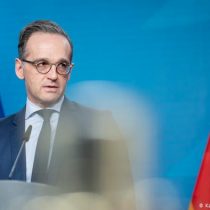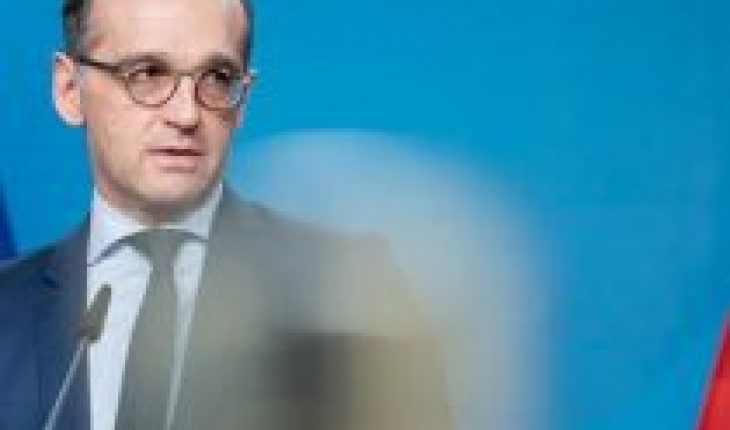
Deutsche Welle: One of the successes of the German Presidency of the Council is undoubtedly that, despite all the differences, the new financial framework and the billions in aid for the coronavirus crisis were established. But when it comes to vaccination, many Europeans wonder why it takes so long and why they feel they have to queue; after all, every day that passes costs lives. Is that risk being accepted?
Heiko Maas: It’s about the two things: speed and caution. To overcome the pandemic, we need to make the vaccine available across the country by 2021. And there will be different vaccines with different properties, also in terms of their logistics and storage. Federal states have set up regional vaccination centers, to which the vaccine is delivered. And on December 27 we will be able to start vaccination, initially in geriatrics and nursing homes, for over 80s and for certain medical personnel.
As Foreign Minister, there is another point that is important to me: we want to ensure that the vaccine is a public good around the world. A safe and affordable vaccine should be available to everyone. The international coVAX vaccine alliance is committed to this goal. Germany has joined and is funding its work with considerable funds.
The new EU budget and aid funds were only possible because the European Union gave in to its demands to shore up the rule of law and the separation of powers, rejected by Poland and Hungary. What has the German Presidency of the Council done to make the EU more capable of acting in the face of such blockades?
Without the agreement for the financial package for the coronavirus, Europe would have found it in fairly turbulent waters on 1 January. The people and businesses most affected by the crisis need this support quickly. It was important to fight for it. In addition, we have the new tool linking to the rule of law. It is an instrument that should not be underestimated. Despite opposition from Poland and Hungary, we have not touched this regulation. The only open question is how the Court of Justice of the European Communities will assess the rule of law in a country, should it be asked to rule on this issue.
Brexit shakes the EU. During the Presidency of the Council, did you feel that more departures could occur? Would greater integration between a small number of countries ensure the EU’s survival?
On the contrary: with the “brexit” debate, the EU’s general acceptance has risen again in almost all member states, especially Germany. I think a lot of people have taken the advantages of the EU for granted because they no longer knew anything else. The “brexit” made very clear once again the advantages: freedom of movement, free trade and the possibility of living, working or studying wherever you want in Europe. Currently, I do not see in any EU country that there is a majority that wants to do without these advantages.
But, of course, we have to draw our own conclusions from the Brexit. In the EU there is already the possibility for a group of member states to introduce common rules without the participation of other countries, so-called “enhanced cooperation”. But the most decisive thing is that in national politics we do not constantly put Brussels in the pillage when something goes wrong. And we need to explain more transparently how we decided in Brussels; after all, all member states are always at the table.
The foreign ministers of China and Germany, Wang-Yi and Maas.
More and more countries want to join the European Union. But expansion talks with Northern Macedonia and Albania are stalled, as are visa liberalization for Kosovars. They were objectives of the German Presidency of the Council. In the Western Balkans there is talk of the “failure of the Germans”. How do you plan to rescue the EU’s credibility in the region?
We are the last to stop this issue in the EU. In essence, the blockade is about the bilateral relationship between Bulgaria and Northern Macedonia. As Presidency of the Council, we have worked very hard to find a solution. Unfortunately without success. Our partners in the Western Balkans have made great strides in recent years, especially in North Macedonia. People see their future in the EU. Therefore, they must be able to trust our promises, otherwise they are far fromCiarán. The prospect of EU membership is an important incentive for political and constitutional reforms, which are also in our own interest. We will continue to work to find a solution in this regard, even after our Presidency of the Council has ended.
There was also hope that the German presidency would advance the dialogue between Greece and Turkey in the eastern Mediterranean. So far it hasn’t been successful. Has Germany failed as a mediator?
THERE are already EU sanctions that were re-extended at the December European Council. These sanctions are specifically targeted at individuals and companies involved in illegal gas drilling. Turkey must now take credible steps to reduce escalation. We have certainly seen signs of détente from Turkey in recent weeks and months, but unfortunately they have always been followed by new and deliberate provocations. This alternation has to end. The offer to guide our relationships according to a positive agenda remains on the table.
The German Presidency of the Council made human rights a priority. At the same time, a lucrative investment agreement with China is sought. Personally, don’t you get repairs?
The main objective of the negotiations for an investment agreement between the EU and China is to create fair conditions for market access. We want German and European companies to have the same access to the Chinese market, it should not be a one-way street. And it’s also about protecting employee rights and sustainability standards. For us, these are the prerequisites for an agreement. In addition, we continue to address human rights violations bilaterally and clearly, at all levels, with respect to China. (lgc/dzc)
* DW’s questions were exceptionally answered in writing.





